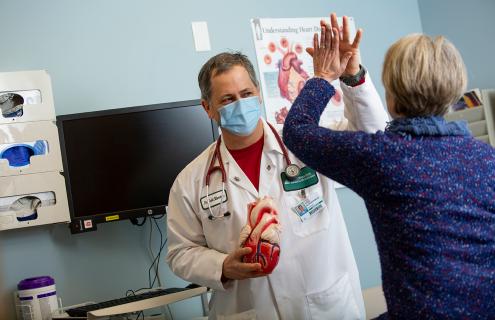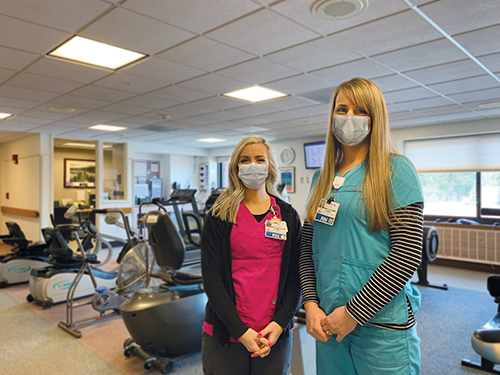
Focus on patient-centered cardiac care
A heart condition that results in a trip to the emergency room can be terrifying and confusing. If you or a loved one is in the midst of a critical cardiac event, rest assured that Cheshire Medical Center can offer you top-notch care, close to home.
Since the American Heart Association reports that nearly half of U.S. adults have some form of cardiovascular disease, it is vitally important to schedule regular visits with your primary care provider who can provide preventative care or a referral to Cardiology to help you manage heart problems before they become serious. Unfortunately, nearly one billion Americans experience a heart attack each year.
“Emergency Department (ED) doctors are excellent at taking care of cardiac conditions because they see so many,” said Alan R. Opsahl, a cardiologist at Cheshire.
In less severe cases, one of Cheshire’s cardiologists examines a patient in the ED, then follows up with a plan of care. Patients with severe cases are transported by helicopter directly to Dartmouth Hitchcock Medical Center (DHMC). Cheshire’s partnership with the only academic medical center in New Hampshire streamlines our ability to deliver the right care at the right time.
Most of Cheshire cardiologists have all worked at DHMC, and collaborate frequently with colleagues there. The heart care provided through the Dartmouth-Hitchcock Health system is among the best, with one of the lowest mortality rates—at 4 percent—in the nation. This means heart patients in the Monadnock Region get the best-coordinated care available from experts who see up to 800 heart attack patients a year.
When we have a patient who needs care at Dartmouth, we know who to call. There is a lot of collaboration behind the scenes.
Alan R. Opsahl, MD – cardiologist at Cheshire Medical Center
Collaboration goes both ways. Local facilities, like Springfield Medical Center and Brattleboro Memorial Hospital, also send patients to Keene for a higher level of care. For example, many are transported for installation and monitoring of devices that use electrical pulses to help control abnormal heart rhythms, like pacemakers, by Todd Silberstein, DO.
Hilary Brown, RN, MSN, the clinical leader of cardiology at Cheshire, said the cardiac team also collaborates with their patients’ doctors and nurses in Primary Care.
“While our focus is on the health of a patient’s heart, we are also dedicated to building relationships with each patient and providing compassionate care,” said Brown. “But the most important collaboration is the relationship between the individual patient and his or her entire team of care providers.”
One of the most important aspects of the doctor/patient relationship is honesty. Opsahl says doctors need to be honest that some patients may no longer be able to participate in certain activities, but they can still lead active lives. At the same time, patients have to be honest with their caregivers and doctors about their symptoms and if they aren’t sticking to their treatment plans.
“We want to keep talking with our patients to keep them from getting sick again,” said Opsahl. “We have patients who come back five or 10 years later and they are still sticking to their plans.”
Members of Cheshire’s cardiology team often see their patients out in the community and take pride in the assistance they provide for the continued recovery of their neighbors. It takes skill and compassion to present an accurate diagnosis and get patients on the path to recovery.
Cheshire’s cardiology team creates personalized care plans that include nutrition, behavioral health, wellness education, and help to establish a regular medication schedule. That’s the type of support that helps patients live longer and have fulfilling, rewarding lives.
“Sometimes, when I run into a former patient at the grocery store, I take a look in their shopping cart,” said Brown. “And when I see fruits and vegetables and lots of good food it makes me so happy.”
“Living in a small town, taking care of people, this is what I think a doctor should be doing,” said Opsahl.
Comprehensive outpatient cardiac rehabilitation with a personal touch
Cheshire Medical Center’s comprehensive outpatient cardiac rehabilitation program is designed for men and women who have experienced a recent heart event or have undergone certain heart surgeries.
Jeannine Lucius, RN, and Kristi Farren, RN, who work with patients in the cardiac rehab program, were recently recognized by a patient as part of Cheshire Medical Center’s Circle of Gratitude. The nurses said the recognition shows they are on the right track in providing care to their clients.

“All of our patients are coming to us after open heart surgery, a heart transplant or a heart attack," Lucius said.
"It’s our job to reassure them it’s OK to try to get back to a normal life. Even though it’s a class of eight, we do a lot of one-on-one work to individualize a treatment plan. They can see that everybody is at different points during the rehab. The person next to them might be at the end of the program while they’re just getting started, thinking I’m never going to feel well again. Working together they can see that it is possible to get better.”
Farren added, "Because the rehab program is ongoing, new patients mix with old patients and learn from each other. Everyone is at a different level when they come in. We meet with them individually and get to know them. We try to make the program fun so it’s not boring or monotonous.”
Read about an innovative program that streamlines access to cardiac catheterization for Cheshire patients.